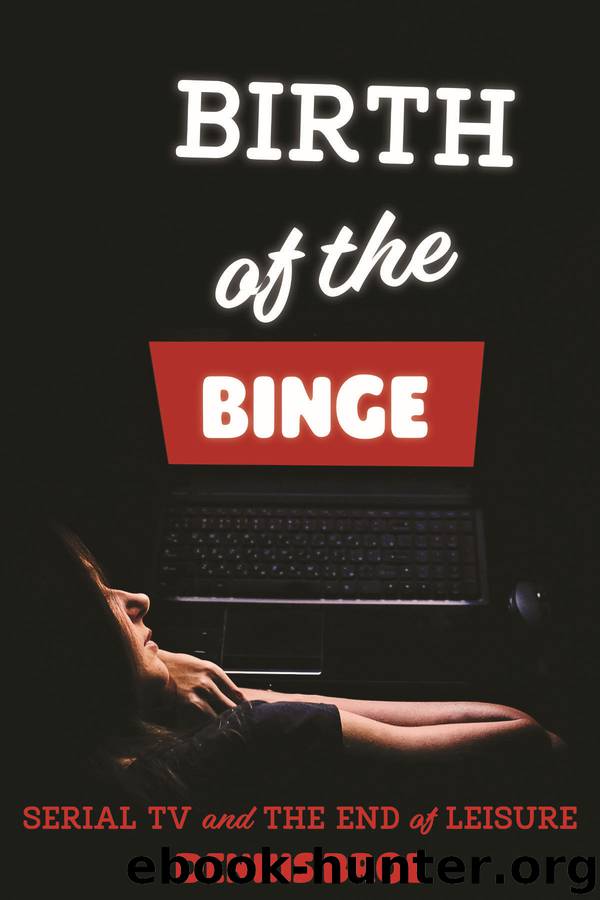Birth of the Binge by Dennis Broe

Author:Dennis Broe [Broe, Dennis]
Language: eng
Format: epub
Tags: PER010030 Performing Arts / Television / History & Criticism
Publisher: Wayne State University Press
Zola’s Serial Totality
Literary seriality, essentially pioneered by Dickens, grew, as did seriality on television, out of the possibility of new modes of production in the wake of the nineteenth century. These consisted of the following: new consumer goods through mass industrialization; a transportation system allowing for a dispersal of goods, including now-proliferating newspapers and magazines; and the “manufacturing” of new, more literate audiences clamoring for these serial representations (Hayward 1997, 28). Dickens, “the first capitalist of literature,” helped fashion the entertainment industry by transforming in 1836 what had been a series of sporting stories into a picaresque novel, The Pickwick Papers. Dickens patterned a formula of increasingly more socially explosive and socially critical content in the wake of the horrors of industrialization but “under a platform of conservative ‘family values’” (38), which would not only become the serial dominant for the next fifty years in its establishing the tropes of the mass-entertainment industry but would also prevail in the next century in Hollywood. The moral perspective would later be challenged in the serial realm by Zola’s (2016) “naturalism,” claiming to be morally neutral and blatantly antibourgeois.
Dicken’s novels were “part-issued” three or four chapters at a time with forced pauses and cliffhangers between editions and thus more able to be consumed by “increasingly rushed readers” (Hayward 1997, 39), the equivalent of serial television’s increasingly under-pressure consumers. The serialized form itself through its “richness of detail and expansion of the text over time suggested, at the height and in the center of the industrial revolution, a world of [capitalist] plenitude” (4) just as the serial television series suggests and often validates the abundance of capitalism’s expansion into a virtual world. The novels also served the function of “organizing random, apparently senseless social relations and economic facts into narrative trajectories” (41) just as serial series like Fringe map the new and terrifying expansion into parallel online worlds. They also marked a new prominence and freedom for their writers as Dickens became wealthy and his novels celebrated by literary critics. Zola, who created the first consciously serialized-from-the-start novelistic series, proclaimed his gratitude for “the realistic possibilities which the reign of money offers to an author,” this freedom from the former world of aristocratic patronage, in which the power of the market might be turned against its creators. “It is necessary,” he wrote, “to recognize the dignity, the power and the justice of money” (Bordieu 1992, 156). Zola’s description perhaps forecasts the new power in the current serial form of the showrunner, at long last an acknowledgement of the crucial role of the writer in Hollywood.
Over the course of Dickens’s almost thirty-year serialized career, his books grew in critical status so that by 1864, the time of his last complete novel, Our Mutual Friend, an essay by a prominent critic titled “Novels with a Purpose” declared him to be “a genius” whose “power over the community . . . [is] beyond that of any author” (Hayward 1997, 37), anticipating the contemporary anointing of television showrunners
Download
This site does not store any files on its server. We only index and link to content provided by other sites. Please contact the content providers to delete copyright contents if any and email us, we'll remove relevant links or contents immediately.
| Direction & Production | Genres |
| Guides & Reviews | History & Criticism |
| Reference | Screenwriting |
| Shows |
Robin by Dave Itzkoff(2441)
Head of Drama by Sydney Newman(2303)
I'm Judging You by Luvvie Ajayi(2205)
The Paranormal 13 (13 free books featuring witches, vampires, werewolves, mermaids, psychics, Loki, time travel and more!) by unknow(2099)
Ten by Gretchen McNeil(1890)
Single State of Mind by Andi Dorfman(1816)
#MurderTrending by Gretchen McNeil(1660)
Key to the Sacred Pattern: The Untold Story of Rennes-le-Chateau by Henry Lincoln(1634)
Merv by Merv Griffin(1616)
Most Talkative by Andy Cohen(1592)
Notes from the Upside Down by Guy Adams(1474)
This Is Just My Face by Gabourey Sidibe(1471)
The Hunger Games: Official Illustrated Movie Companion by Egan Kate(1441)
Binging with Babish by Andrew Rea(1421)
Springfield Confidential by Mike Reiss(1417)
Jamie Oliver by Stafford Hildred(1391)
The TV Writer's Workbook: A Creative Approach To Television Scripts by Ellen Sandler(1351)
Clarkson--Look Who's Back by Gwen Russell(1345)
Blue Planet II by James Honeyborne & Mark Brownlow(1284)
